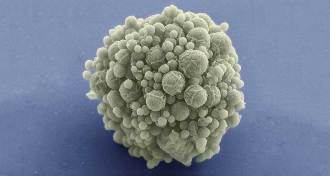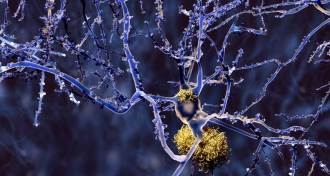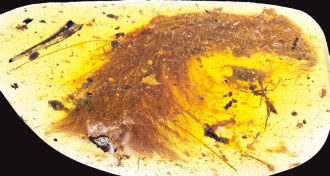Life
Sign up for our newsletter
We summarize the week's scientific breakthroughs every Thursday.
-
 Genetics
GeneticsYear in review: How humans populated the globe
DNA studies put new twists on timing of ancient human migrations – but genetics alone are not enough to tell the full story.
By Bruce Bower -
 Life
LifeYear in review: ‘Minimal genome’ makes its debut
A synthetic cell reported this year jettisons unnecessary genes and embraces human design principles.
-
 Neuroscience
NeuroscienceYear in review: Alzheimer’s drug may clarify disease’s origins
Researchers will now test whether a treatment that swept away amyloid brain plaques also improves cognitive performance.
-
 Oceans
OceansReaders contemplate corals and more
Coral engineering, ancient almanacs and more in reader feedback.
-
 Health & Medicine
Health & MedicineThe fight against infectious diseases is still an uphill battle
The fight against infectious diseases is far from over. The last several decades have seen many outbreaks and global pandemic scares.
By Sonia Shah -
 Ecosystems
EcosystemsOyster deaths linked to ‘atmospheric rivers’
Atmospheric rivers bring strong storms that could have been behind a 2011 California oyster die-off.
-
 Earth
EarthFossil microbes show how some life bounced back after dino-killing impact
Pioneering microbes colonized the waters above the Chicxulub crater within hundreds of years following the impact, new research shows.
-
 Life
LifeZika induces brain cell die-off
Cell biologists are learning more about how the Zika virus disrupts brain cells to cause microcephaly.
-

-
 Life
LifeCell biologists learn how Zika kills brain cells, devise schemes to stop it
Cell biologists are learning more about how the Zika virus disrupts brain cells to cause microcephaly. Meanwhile, several strategies to combat the virus show preliminary promise.
-
 Paleontology
PaleontologyDinosaur tail preserved in amber, with feathers
The tail of a dinosaur trapped in amber includes both feathers and identifiable bits of bone.
By Meghan Rosen -
 Life
LifeCells avoiding suicide may play role in spread of cancer
A newly discovered process can pull cells back from the brink of death.